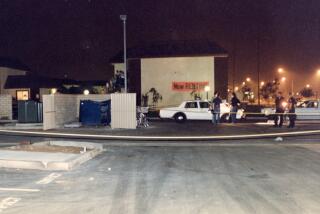Woman Called Death of Baby an ‘Abortion’ : Courts: A farm worker accused of dropping a newborn in a toilet appears able to defend herself, a therapist testifies.
A farm worker accused of killing her newborn son by dropping him into a portable toilet told a court psychiatrist that she had been arrested for having an abortion, the therapist testified Friday.
“I asked her why she was in custody, and she said: ‘Because I had an abortion . . . because the baby was too big,’ ” said Donald Patterson, a psychiatrist who interviewed Maria Sanchez Jimenez on Oct. 8.
Sanchez is accused of murder in the death of her baby boy, who is believed to have died within minutes after birth from breathing fecal matter and chemicals in the portable toilet.
Investigators say Sanchez, 22, gave birth in the portable toilet on July 28 while working in a Saticoy onion field. She also is accused of trying to kill another of her children, who was allegedly thrown into a toilet at an Oxnard house but was rescued by another resident.
“I came away with the idea that she didn’t know what an abortion was,” Patterson said.
But Deputy Dist. Atty. Carol J. Nelson countered that the comment about the baby’s size indicates that the mother knew the legal implications of aborting a pregnancy and knew that her child was too developed to be legally aborted.
The psychiatrist’s disclosure came near the end of a three-day hearing in Ventura County Superior Court, where Sanchez’s attorney, Assistant Public Defender Jean L. Farley, sought to exclude as evidence a three-hour taped interview that Sanchez had after her arrest. Judge Frederick A. Jones will rule after receiving written arguments next Tuesday.
Farley has argued that Sanchez, who has pleaded not guilty and not guilty by reason of insanity, did not understand key elements of the so-called Miranda warning that is supposed to be given to all criminal suspects. The warning advises defendants of their right to an attorney and the right to remain silent.
Last Friday, defense psychologist Jose LaCalle testified that Sanchez is “borderline mentally retarded” and cannot comprehend a sentence longer than 10 words. He said she misunderstood when the investigator asked if she comprehended the warning. When she replied yes, LaCalle said, she thought she was being asked whether she wanted an attorney.
Other witnesses testified that the translation of the Miranda warning given to the Spanish-speaking Sanchez was mispronounced in several key areas.
In any event, Sanchez did not have an attorney during the interview, which was conducted by a Ventura County sheriff’s deputy and a district attorney’s investigator.
Patterson interviewed Sanchez to determine whether she was competent to stand trial, not whether she understood the Miranda warnings. He agreed that the defendant “has some problems in her intellectual abilities” and added: “Her thinking is quite simplistic.”
He described Sanchez as shy, “as her posture here in court indicates.” Throughout the hearing, as she has in other court appearances, Sanchez sat at the defense table with her head bowed, communicating only occasionally with an interpreter who translated the court proceedings into Spanish. At one point, the interpreter pulled the defendant’s long black hair from in front of her face.
But Patterson, who interviewed Sanchez for nearly two hours, said she appeared “capable of defending herself.” For example, he said, when Sanchez was asked about a burn suffered by the infant who survived, she said: “It wasn’t my fault, it was the other woman’s fault.” It was not clear whom she meant by the other woman.
The three-hour interview with investigators has not been made public. Nelson would say only that in the taped conversation, Sanchez provides “her version of the facts” and explains her conduct in both the death of the baby and the injuries suffered by the other child, who has been placed in a foster home.
Nelson said the interview is not crucial to the prosecution, but added: “I want to put as much evidence as I can in front of the jury.”
Both attorneys have agreed that Jones’ ruling on whether to admit the tape will be binding no matter which judge actually presides at the trial, scheduled to begin Jan. 6. Jones, who is expected to move from the criminal bench to a family-law judgeship early next year, said the case may be assigned to a different judge.
More to Read
Sign up for Essential California
The most important California stories and recommendations in your inbox every morning.
You may occasionally receive promotional content from the Los Angeles Times.








